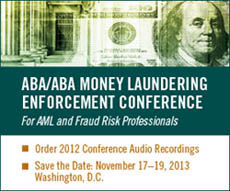What really keeps you awake at night?
Everyday compliance depends on staff getting it right--and just "getting it"
- |
- Written by Lucy Griffin
- |
- Comments: DISQUS_COMMENTS

We have all been asked what keeps us awake at night. Usually this question really means, "Which regulation has you most scared?"
But is it really the regulations themselves that keep you awake at night?
Or could it be something else?
What we have here, is a failure to behave
The problem, frankly, is that people don't always do as they are told. And therein lies the compliance nightmare.
There are as many opportunities for violations as there are employees.
More, actually,
Because some people will ignore instructions more than once.
That's what really keeps us awake at night.
Why you need a "real world" training program
The real burden, when it comes to compliance, is not simply the specific requirements of regulations, but the people who must carry them out. And that is what compliance "programs" are all about: managing and persuading people.
Training is one of the most important places where we "persuade" people to comply. But perhaps something is missing in the training, even if your training program addresses every single regulatory requirement on the planet.
The thing is, covering specific requirements may not be enough. People need reasons to do things that they consider inconvenient, bothersome, or not in their primary interest.
So training should deal not only with the regulatory requirements, but also with the human side of compliance.
How to put "real world" training into action
The challenge is how to deal with these very human tendencies in training and provide motivation to do things completely and correctly. Here are a few ideas. Add yours to the list.
- • Branch staff good old boys and girls: They resists completing CIP information because "I've known him since kindergarten!"
Training: "Just because you know this person well doesn't mean that everyone in the bank does. Other people in the bank need this information to give your friend good service."
- • Mr. (or Ms.) Busy: "I don't have time to fill out those silly sign-out slips in the file room. When I need a file, I need it fast."
Training: "The problem is that when anyone needs a file, they need it fast. The slip tells them where to find it. And this includes examiners!"
- • Monitoring information miscreants: "I can't be bothered filling out all that HMDA stuff when I have a live customer talking to me about a loan. My job is to make loans. Filling out forms is for those compliance people."
Training: How long does it really take to write down information like today's date or the loan amount or type? Compare your time to the time it takes to do a HMDA scrub. Next time, the bill for the HMDA scrub should come from the lender's budget.
- • Availability "advocate": "No, I didn't place the hold. Why not? Because it's too complicated. Besides, customers like it better when there isn't a hold. Isn't that good service?"
Training: "We place holds to manage risk. When we know or reasonably believe there is a problem with a check, the hold protects the bank from loss. Think about whether you would want this to come out of your pocket."
- • Mr. Hide It In The Stack: "I was too busy to deal with that paperwork. That's why I didn't forward the file for the adverse action notice. Besides, the customer already knew the loan would be denied. What's my priority here, anyway?"
Training: You may have already told the customer, but adverse action notices serve several purposes. They contain information, such as how to contact the credit bureau, that can help the consumer correct problems. Besides, failure to send notices is an easy violation to catch because there is a paper trail. It's also easy to prevent. Take ten seconds to forward the file.
- • Mr. Over His Head: "Flood certifications don't really matter. If the property is in a flood zone, the customer already knows it."
Training: Customers don't always--or even usually--know that their property is in a high-risk zone. They just think they got a really good price on it. Remember that if the property is located in a high-risk flood hazard zone, you cannot close the loan until the borrower has insurance. Not ordering a flood cert on time can prevent you from closing on schedule.
- • Mr. Didn't watch enough Perry Masons: "I don't need to review stuff that comes back from the lawyers. If there was a mistake or anything important, they'd tell me."
Training: No-one knows the loan specifics better than the loan officer. You are in the best position to catch errors. People down the line--and the computer system-- can only use the information they get. Mistakes in documentation can have expensive consequences.
I could go on, but I'd love to hear yours. So would fellow compliance officers.
Don't be "Mr. Too busy complying to post a nightmare."
Disclaimer: Lucy Griffin's views are her own, and not necessarily those of the American Bankers Association.
Tagged under Compliance, Blogs, Common Sense Compliance, Compliance Management,














